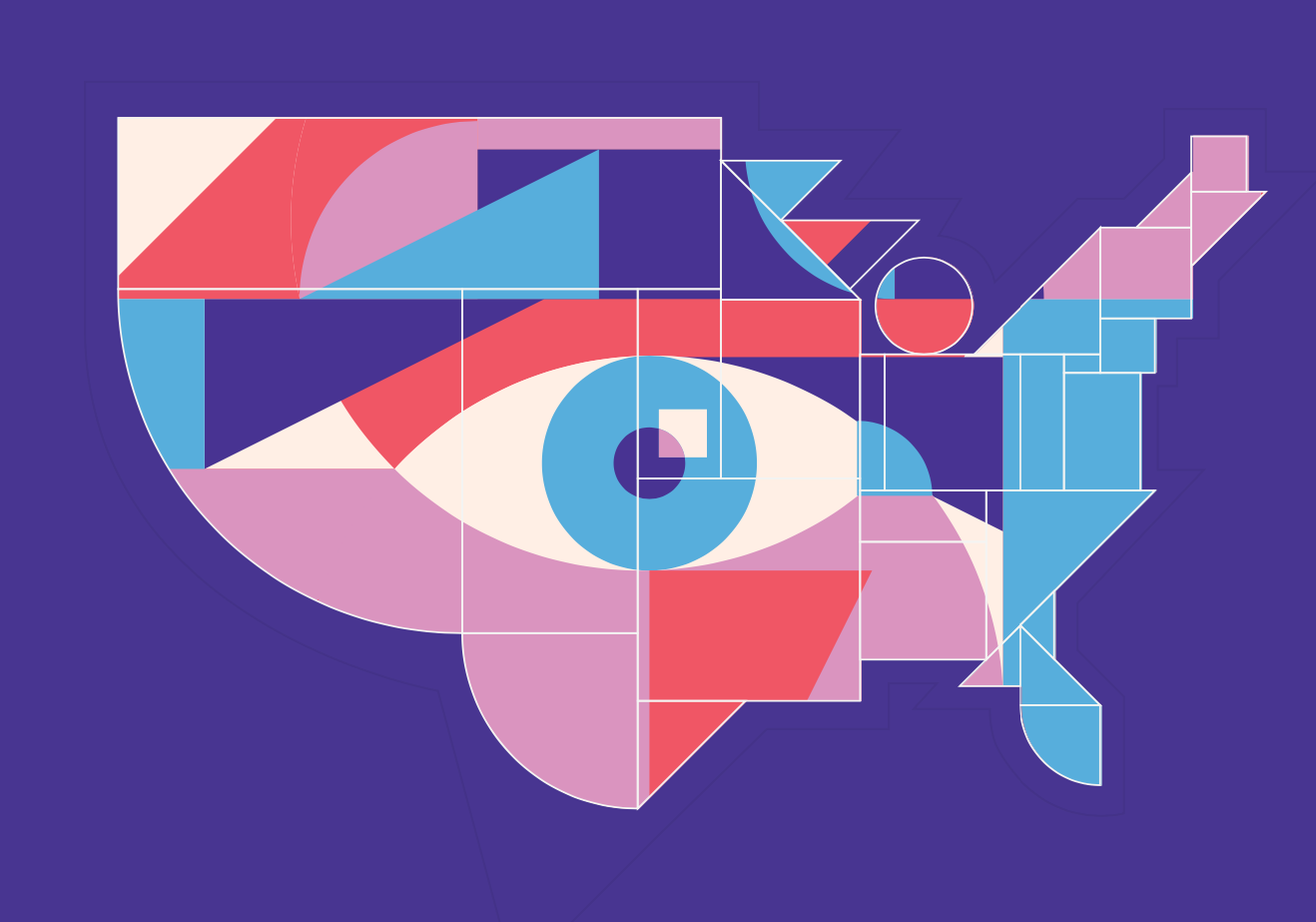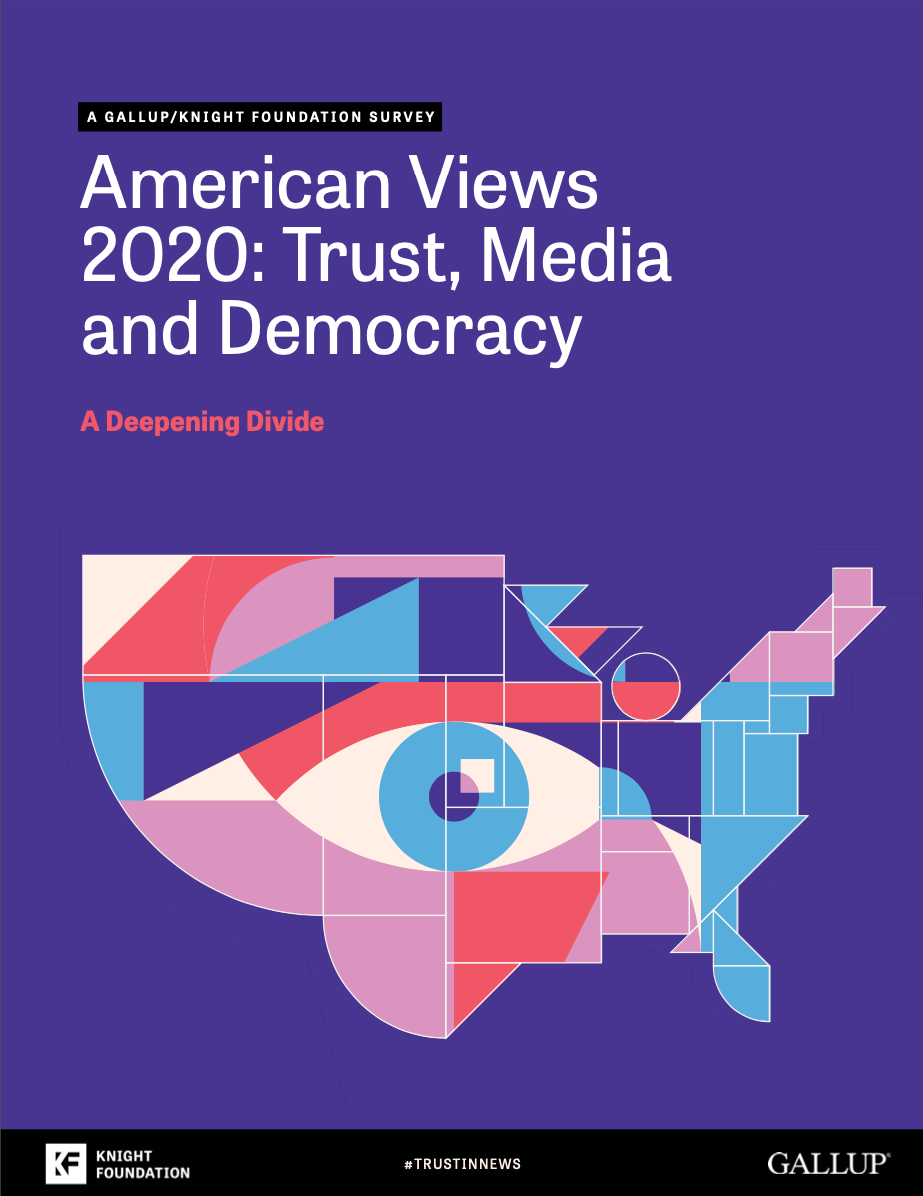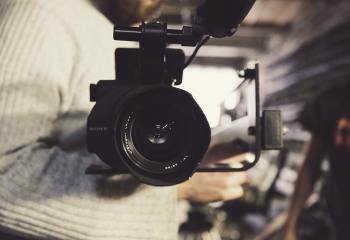Overview
Update: On Nov. 9, 2020, Gallup updated the report “American Views 2020: Trust, Media and Democracy,” to correct a methodological error. The changes do not alter the underlying integrity of the data nor the conclusions. However, specific numbers have changed for a range of results. Learn more.
There is a widening gulf between American aspirations for and assessments of the news media. With each passing benchmark study, the American people render deeper and increasingly polarized judgments about the news media and how well it is fulfilling its role in our democracy.
In 2018, Gallup and Knight Foundation published the inaugural American Views report as part of their Trust, Media and Democracy research program. This landmark study of Americans’ attitudes toward the news media and its role in our democracy is part of the ongoing Gallup/Knight research effort. The 2018 report found that while Americans valued the role of the news media as an important institution in a free society, they did not believe it was fulfilling its democratic roles well. Political party was the primary determining factor driving Americans’ opinions of and trust in the media.
For the 2020 American Views survey, Gallup and Knight polled more than 20,000 U.S. adults and found continued pessimism and further partisan entrenchment about how the news media delivers on its democratic mandate for factual, trustworthy information. Many Americans feel the media’s critical roles of informing and holding those in power accountable are compromised by increasing bias. As such, Americans have not only lost confidence in the ideal of an objective media, they believe news organizations actively support the partisan divide. At the same time, Americans have not lost sight of the value of news — strong majorities uphold the ideal that the news media is fundamental to a healthy democracy.
Gallup and Knight publish these sobering findings at a moment when America’s media landscape is increasingly shaped by the financial exigencies of the attention economy — and when journalism, like other democratic institutions, is growing more vulnerable to polarization and eroding trust.
As evidenced in this study, party affiliation remains the key predictor of attitudes about the news media. Republicans express more negative sentiments on every aspect of media performance compared to Democrats and independents. Attitudes also differ by age — likely a reflection, in part, of generational differences in news consumption, as this study documents a concerning negative trend in young Americans’ opinions of the news media.
This report is based on data collected between Nov. 8, 2019, and Feb. 16, 2020, just before the novel coronavirus became a global pandemic and the burgeoning movement for racial justice swept the nation. The low levels of public trust in the nation’s polarized media environment have left open the possibility for dangerous false narratives to take root in all segments of society during these emergent crises. At a time when factual, trustworthy information is especially critical to public health and the future of our democracy, the striking trends documented here are cause for concern. American Views offers new insights into how the public is responding to these challenges in their own media consumption and their thoughts about how to address them.
Executive Summary
1. Americans still value the media’s traditional roles in society, such as providing accurate news and holding powerful interests accountable for their actions.
- The vast majority of Americans (81%) say that, in general, the news media is “critical” (42%) or “very important” (39%) to democracy.
- Large majorities say it is “critical” or “very important” for the news media to provide accurate and fair news reports (88%), ensure Americans are informed about public affairs (88%) and hold leaders accountable for their actions (82%).
- More Americans say the media is performing poorly rather than well in accomplishing these goals.
2. However, Americans see increasing levels of bias in the news media; majorities see bias in the news source they rely on most.
- A majority of Americans currently see “a great deal” (46%) or “a fair amount” (37%) of political bias in news coverage.
- Most Americans see bias in their go-to news source; 21% see “a great deal” and another 36% see “a fair amount” of bias in the news source they rely on most often.
- Given the choice, however, more Americans say they are concerned about bias in the news other people are getting (64%) than say they worry about their own news being biased (34%).
- Sixty-eight percent of Americans say they see too much bias in the reporting of news that is supposed to be objective as “a major problem,” up slightly from 65% in the 2017 study.
3. Americans suspect inaccuracies in reporting are designed to push a specific agenda
- Americans perceive inaccurate news to be intentional — either because the reporter is misrepresenting the facts (52%) or making them up entirely (28%).
- Nearly 3 in 4 Americans (74%) say news organizations they distrust are trying to persuade people to adopt a certain viewpoint, while 16% say they are trying to report the news accurately and fairly but are unable to do so.
- Nine percent of Americans say distrusted media are trying to ruin the country, driven largely by the 1 in 5 Americans who identify as “very conservative” and 1 in 7 Republicans who feel this way.
4. Differences in Americans’ opinions of the news media are most pronounced by political party affiliation.
- Two-thirds of Republicans (67%) have a “very” or “somewhat” unfavorable opinion of the news media, compared to 20% of Democrats and 48% of independents.
- Democrats and Republicans differ greatly in their ratings of the media on every aspect of performance, including providing objective news reports, holding political and business leaders accountable for their actions and helping Americans stay informed about current affairs.
- Sixty-five percent of Americans, including 57% of Democrats, say the increasing number of news sources reporting from a particular point of view is “a major problem.” In contrast, 75% of Republicans say the same.
- While a majority of Americans across the political spectrum (77%) say the media is under attack politically, they are divided as to whether those attacks are merited. Whereas 66% of Democrats say the media is under attack and those attacks are not justified, 58% of Republicans say such attacks are justified.
- In addition to partisan differences in media attitudes, views also vary by age, with older Americans generally more favorable toward the news media than younger Americans. Whereas 43% of Americans aged 65 and older have “very” or “somewhat” favorable views of the media, 1 in 5 Americans under age 30 (20%) say the same.
5. Majorities of Americans say news organizations should diversify their reporting staffs, but they differ — largely by politics — on the focus of diversity efforts.
- A strong majority of Americans (75%) say news organizations should hire to increase the diversity of their reporting staffs. However, while majorities say it is important for the news media to reflect the diversity of America, this ranks lowest of the priorities among the roles for media to play in society.
- The priorities cited by Americans who say news organizations should hire for more diversity differ greatly by race and political party. Democrats (47%) and Blacks (56%) prioritize racial/ethnic diversity in hiring, while Republicans (48%) and Whites (34%) are most apt to prioritize diversity in political views.
6. Americans commonly feel overwhelmed by the volume and speed of news, but say misinformation online is media’s greatest problem. Those overwhelmed are most likely to turn to one or two trusted news sources as a solution.
- Three in 4 Americans (74%) say the spread of misinformation online is “a major problem,” exceeding all other challenges posed by the media environment.
- Seventy percent of Americans want to see major internet companies find ways to exclude false/hateful information online.
- More Americans say it is harder (60%) rather than easier (38%) to be well-informed because of all the sources of information available. In 2017, 58% said it was harder to be informed.
- Reasons Americans who say it is harder to stay informed cite for feeling overwhelmed include the mix of news interspersed with non-news on the web (68%), followed by an increased number of organizations reporting the news (63%) and the pace or speed of news reporting (61%).
- More Americans (51%) say there are enough media sources to sort out the facts than say there is so much bias it’s difficult to sort out the facts (45%), a slight improvement from 2017 when the split was 50% to 47%, respectively. Republicans (64%) are much more likely than independents (50%) and Democrats (24%) to say there is too much bias to sort out the facts.
- In response to feeling overwhelmed, 39% of Americans say they only pay attention to one or two trusted sources; 30% try to consult a variety of sources to see where they agree; 18% go to the extreme of ceasing to pay attention to news altogether; and 9% rely on others to help them sort out what they need to know.
7. Local news plays a key role in political and civic engagement.
- Thirty-three percent of Americans say they follow news about issues affecting their local community “very closely,” an increase from 25% in 2017. However, most Americans are not very confident in their knowledge relating to public affairs in their community.
- Americans who follow local news closely are more likely to vote in local elections and to feel attached to their communities. They are less likely to say that “people like me don’t have any say in what the government does.”
- Americans who primarily access their news online — predominantly, younger Americans — are less likely to be knowledgeable about their local communities and to feel attached to their communities.
8. In a deeply divided nation, majorities of Americans say the media bears blame for political division. But they also see the potential for the media to heal the divide.
- Forty-seven percent of Americans say the media bears “a great deal” of blame for political division in this country, while 36% say it bears “a moderate amount.”
- But nearly identical percentages say the media could do “a great deal” (49%) or “a moderate amount” (34%) to heal those divisions.





